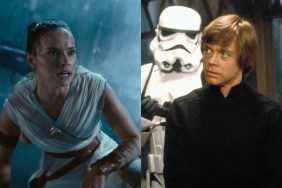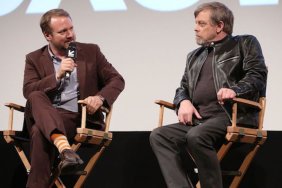It’s been two months since the release of the most recent entry in the Star Wars franchise, The Last Jedi, and fans are still having heated discussions over the film, some defending the more character-driven story while others criticize it for its minimal plot progression.
Even Mark Hamill, the legend behind the character of Luke Skywalker, reversed his comments against the film’s script penned by director Rian Johnson after seeing the film as a whole and realizing his character’s journey was far more intelligent and appropriate when placed in the proper context.
Amidst the waves of supporters for the film was actor Joseph Gordon-Levitt, who has been a consistent collaborator of Johnson on every film of his, playing the lead protagonist in his debut Brick and his sci-fi debut Looper, as well as featuring in cameos in The Brothers Bloom and Jedi.
In a blog post on publishing platform, Medium, Gordon-Levitt took to not only defending the film, but specifically Johnson’s choices in the progression of Skywalker in the years since audiences last saw him in Episode VI: Return of the Jedi, which was a highlight of criticism from fans.
*Warning: Spoilers Lie Ahead For The Last Jedi*
In the film, Skywalker has become cynical and has isolated himself on the oceanic planet of Ahch-To following his failure to properly train Kylo Ren as a Jedi and is living a life of exile from the rest of the galaxy and the Force. Upon Rey’s arrival on the planet, he initially refuses to train her in fear of his previous failure, but is convinced by R2-D2 to teach her. During this training, Rey learns of Luke’s consideration of killing Ren to prevent Supreme Leader Snoke’s hold over him, but Rey believes Ren can be redeemed and races off to confront him without Luke. Luke attempts to burn down the first Jedi temple on the planet but is visited by Yoda’s ghost who burns it himself, telling Luke to learn from his failure and move on and that Rey has learned all that she needs.
Gordon-Levitt started his blog post by acknowledging he does hold a certain bias towards Johnson, calling him “a good friend of mine,” and citing their previous work together as a “brotherly streak.” However he does go on to say that his post is not to defend Johnson’s character decisions for Skywalker from a friend’s standpoint.
“He doesn’t even know I’m writing this. I guess I should probably make sure it’s cool with him if I’m gonna post it publicly,” Gordon-Levitt wrote.
He also acknowledges that the “new Old Luke” is not the same as “the Luke of old,” as the previous entries saw Luke as a pure hero who wouldn’t even kill Darth Vader, whereas Jedi saw him attempt to kill his nephew (Ren) in his sleep. Gordon-Levitt argues that rather than chalk this up as bad storytelling and a “bastardization” by Disney, viewers should appreciate the two risks Johnson and company took.
1) He’s different than he used to be.
2) Not only is he different, he’s changed for the worse.

The 36-year-old actor argued on the first point that while the filmmakers could have left Luke unchanged, as they did Han Solo in The Force Awakens, it would have been “a huge missed opportunity,” as the rare chance of bringing back an actor from a previous trilogy to portray the elder version of the character some 40 years later in a new trilogy gives those behind and in front of the camera the possibility to highlight one of humanity’s key experiences: “getting older.”
“We all get older, and those of us who are lucky enough to survive our youth all face the joys, the terrors, the puzzles, the pitfalls, the surprises, and the inevitabilities that come along with doing so,” Gordon-Levitt wrote. “Re-meeting our beloved protagonist decades after we last saw him, only to learn that the passing years have changed some of his most fundamental qualities, I’ll admit, it’s almost hard to see. But in that glaring contrast between the Luke of old and the new Old Luke, The Last Jedi offers a uniquely fascinating portrayal of a man’s life marching inescapably forward.”
On the second point, Gordon-Levitt pointed out that when a character in a film is pure, they are “thin” and “light,” noting that “no one is a perfect hero or perfect villain,” and that a character’s flaws are what makes the interesting to watch. Thus, Luke’s cynicism and isolation is a testament to his flaw of losing his faith in the world, which JGL says is exactly what the story is driving in the opposite direction from.
“To me, this is a story about not losing faith: faith in the outside world, faith in your allies as well as your enemies, in the future as well as the past, in the next generation that will take your place, and yes, faith in your own damn self,” he wrote.
He writes that audiences needed to see this “despair” and “indifference” from Luke in the film, because when it came time for Luke to make his sacrifice to the First Order, it doesn’t just work to stall the antagonists and allow the Resistance to escape, but it also highlights Luke arriving at the end of his journey.
Gordon-Levitt says that because Luke re-finds his faith in everything from his past to the future of the Jedi Order to himself, the film captured any good story’s progress of the glaring contrast between the start and the end to deliver its themes.
Despite his strong arguments in support of the film, Gordon-Levitt did also acknowledge that those reading it were entitled to their own opinion and that he was by no means an expert in the films, nor the storytelling behind Jedi.
He did end his post saying that fans should, however, revisit the film and find their faith in Lucasfilm that “a big Hollywood studio would take such risks on such a big property ,” as it indicates they are not focused on making a quick buck, but instead want to deliver quality product.
What do you think about Gordon-Levitt’s arguments for Last Jedi? Do you think Lucasfilm should continue to take these kinds of risks?








